
|

|
 |
|
|
An up close and personal interview with U.S. Police Veteran and Togetherweserved.com Member:
DET Michael F Ryan (1969-1974)
Baltimore Police Department
WHAT INFLUENCED YOUR DECISION TO MAKE A CAREER IN LAW ENFORCEMENT?
 About a year before my enlistment was over in the Air Force, I began looking at different options on what to do when I got out. I didn't have any real ideas, just the normal stuff of wanting a steady job with decent pay and hopefully one with a future. There was one requirement, however. It had to be one where I could assist others, to help them when they need help the most. About a year before my enlistment was over in the Air Force, I began looking at different options on what to do when I got out. I didn't have any real ideas, just the normal stuff of wanting a steady job with decent pay and hopefully one with a future. There was one requirement, however. It had to be one where I could assist others, to help them when they need help the most.
I didn't know what it was until I heard of a program called Law Enforcement Education Program (LEEP) and if you were a veteran, they would pay for your college credits. I applied for and was accepted in the Baltimore City Police Department two days after I was discharged from the Air Force in February 1969.
WHAT HAS BEEN YOUR CAREER PATH AND WHAT ARE YOU DOING NOW?
I was a Baltimore Police Officer from 1969 until 1974. That's me with a scowl on my face (second step up) in the cropped photo of my academy graduation class 69-3.
When I went through the Baltimore Police Academy, students who graduated with a 90 or above grade-point average could  pick what patrol agency they wanted. It was an incentive for us to reach for excellence, I suppose. I was fortunate enough to have graduated at that level so I decided on the Tactical Division (TAC), which I got. pick what patrol agency they wanted. It was an incentive for us to reach for excellence, I suppose. I was fortunate enough to have graduated at that level so I decided on the Tactical Division (TAC), which I got.
The purpose of TAC was to supplement high crime district units and to quell riots or to be on hand if there was a real threat of a riot or other disturbances. To be ready for our tactical missions, we received extra training in riot and crowd control tactics, building-clearing tactics and other tactical training. The training prepared us well for the job. We successfully responded to multiple riots at the Maryland Penitentiary and assisted in controlling campus riots at the University of Maryland. While it was out of our jurisdiction, we were temporarily given the authority to act.
When I was first assigned to TAC, I was put in plain clothes to work robbery in the immediate downtown area. I was told by the officer in charge of TAC it was because I was young, fast and in great shape having just come out of the military. That was from June 1969 until January 1970 when I was put back in uniform working for the best supervisor in the department, Sgt. Robert Kues.
The 1970s was a rough period for law enforcement throughout the United States. During the five years I was a police officer, 12 Baltimore police officers were killed. Each death was felt by the rank and file but the one that gave me the greatest concern happened on Friday, April 24, 1970. Officer Donald Sager was shot and killed and his partner was seriously wounded as they sat in their patrol car writing a report. Three men, members of the radical Black Panthers, walked up behind and on each side of the patrol car and opened fire with automatic handguns. Officer Sager was killed instantly and his partner, Officer Sarakowski, was seriously wound by four bullets. Two of the suspects were apprehended near the scene an hour later. The third suspect was apprehended two days later.
The reason the killing upset me was the similarities of what I had done around the same time just the night before Sager was assassinated. I handled a call in the same block and sat in my squad car at almost the same spot to write my report. I often wonder if the assassins had picked 24 hours earlier to kill a cop, I might be dead now.
A raid on the Black Panthers resulted in more arrests on parole violations and felony weapons and narcotic charges.
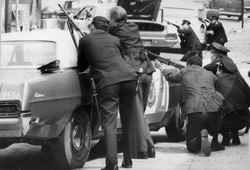 I had only been in uniform a couple of months when Sgt. Kues made me the acting sergeant (OIC). I asked him, "Why me? You have guys with 14 years experience in the squad." He told me that it wasn't because I was such a hot shot, but because I could write a good report and the other cops could not. He admitted that when he wasn't around the squad could take care of itself but he wanted me to make sure all reports were done correctly. I was OIC for 3 years. Kues would send me and others to different units such as Homicide, Burglary and Auto Theft whenever a request from other units for extra bodies was received. He told me, "Boy, you keep your mouth shut and when you make Major, you can get me as your driver." Apparently he saw something in me that I did not discover until a few years into my career as a police officer. Unfortunately, that "thing" also caused my termination. But I am getting ahead of myself. I had only been in uniform a couple of months when Sgt. Kues made me the acting sergeant (OIC). I asked him, "Why me? You have guys with 14 years experience in the squad." He told me that it wasn't because I was such a hot shot, but because I could write a good report and the other cops could not. He admitted that when he wasn't around the squad could take care of itself but he wanted me to make sure all reports were done correctly. I was OIC for 3 years. Kues would send me and others to different units such as Homicide, Burglary and Auto Theft whenever a request from other units for extra bodies was received. He told me, "Boy, you keep your mouth shut and when you make Major, you can get me as your driver." Apparently he saw something in me that I did not discover until a few years into my career as a police officer. Unfortunately, that "thing" also caused my termination. But I am getting ahead of myself.
When a certain rock group came to Baltimore there was always a mini-riot in the downtown area. As a preventive measure, my squad was detailed one night to walk a foot post around the building which was a block long and wide. It was raining cats and dogs that night . As we walked our foot post in the heavy downpour, Sgt. Kues was driving around the lieutenant (LT)shift commander. The squad car pulled up next to me and the LT cracked his window and called me over to the car. I walked over and rendered a perfect stiff salute. He asked me, "What the hell do you think you are doing?" I answered, "Walking my post, sir." " Who the hell told you could carry an umbrella while walking a foot post?" he demanded.  Somewhat taken aback, I answered, "Why, my sergeant, sir!" Sgt. Kues turned a few different shades of red as he began yelling at me. What he couldn't see was the LT, who still had his back to him, had a prankster smile spread across his face. Realizing I was not in trouble with the LT, I said, "Sergeant, when we first met after you took over the squad you told me that you didn't want anyone in your squad who was so stupid as to get wet, cold or hungry. I am only doing what you told me, sir." I thought the LT was going to go into convulsions as he opened the back door and told me to deposit it. I opened the door wider and go in the car. "NOOOOOOOO, " yelled Sgt. Kues, "Not you Ryan, just the damned umbrella!" It was a fun time back then and by the way, after the concert our unit made 17 arrests in about 30 minutes and there was no mini-riot because we nipped it in the bud before it got out of hand. Somewhat taken aback, I answered, "Why, my sergeant, sir!" Sgt. Kues turned a few different shades of red as he began yelling at me. What he couldn't see was the LT, who still had his back to him, had a prankster smile spread across his face. Realizing I was not in trouble with the LT, I said, "Sergeant, when we first met after you took over the squad you told me that you didn't want anyone in your squad who was so stupid as to get wet, cold or hungry. I am only doing what you told me, sir." I thought the LT was going to go into convulsions as he opened the back door and told me to deposit it. I opened the door wider and go in the car. "NOOOOOOOO, " yelled Sgt. Kues, "Not you Ryan, just the damned umbrella!" It was a fun time back then and by the way, after the concert our unit made 17 arrests in about 30 minutes and there was no mini-riot because we nipped it in the bud before it got out of hand.
One night when I was on duty as the OIC, two of my officers got involved in a shooting. The suspect was firing two powerful, semi-automatic 9mm handguns using hollow tip rounds while the two police officer could only return fire with .38 cal., six-shot revolvers using round ammunition. The difference in weapons and bullets was telling. The suspect, near his car less than 30 feet away from the officers, fired repeatedly, shooting out the squad car's windshield, side windows and rear window. The suspect's car had only some dents and the bullets from the officers' weapons were laying on the ground flattened by the impact. I had tried to get the leadership to order better ammo, but it was not until Officer Lorenzo Gray was shot and killed did the powers to be act on a change.
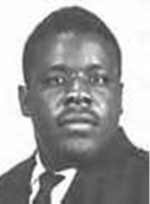 Officer Lorenzo Gray and his partner entered a hotel on the Pulaski Highway on Wednesday, July 26, 1972 to investigate a report of a holdup when he was hit by a shotgun blast. Although mortally wounded, he managed to return fire wounding the suspect's accomplice. Both men were apprehended as they ran from the hotel by a team of federal agents on an unrelated stake-out. Officer Lorenzo Gray and his partner entered a hotel on the Pulaski Highway on Wednesday, July 26, 1972 to investigate a report of a holdup when he was hit by a shotgun blast. Although mortally wounded, he managed to return fire wounding the suspect's accomplice. Both men were apprehended as they ran from the hotel by a team of federal agents on an unrelated stake-out.
Following this incident, the department switched from round nose ammo to a semi-wad cutter. Around the same time, another change was made when a 1973 Civil Service Commission did away with gender classification when they authorized the single category of Police Officers instead of the decades use of policemen and policewomen.
In 1973 I tested for and was transferred to the Criminal Investigation Division as a detective working in the Auto Squad. I was assigned to the Northwestern District where thieves were stealing about 250 cars a month. After a few months on the job, I instituted new measures to track stolen cars from one district to another and was able to isolate about a dozen juveniles who were stealing a car from one place driving to another; dumping the hot car and stealing another one to drive back home and dropping off that car. 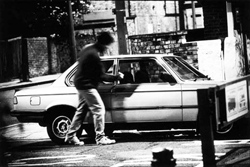 The system worked beautifully! In a little over a year we had the number of stolen cars cut in half: 250 to 125 a month. Part of the reduction in stolen cars was also due to having two teams working together. One detail was on the roof of a shopping mall watching for car thieves in the act of breaking into a car and calling down to an undercover detail on the ground to move in to make the arrests. The system worked beautifully! In a little over a year we had the number of stolen cars cut in half: 250 to 125 a month. Part of the reduction in stolen cars was also due to having two teams working together. One detail was on the roof of a shopping mall watching for car thieves in the act of breaking into a car and calling down to an undercover detail on the ground to move in to make the arrests.
I tested for Sergeant at Sgt. Kues' prompting and passed the written and oral exams and received my promotion with a date of December 1974. In August of 1974, I was back in uniform working the Central District on foot. But I never got the chance to sew on my sergeants stripes.
I was vice president of the AFL-CIO police union when a national review came out rating the effectiveness, efficiency and crime clearance of all the large police departments throughout the United States. The Baltimore Police Department had been ranked among the top 20 departments. Problem was, our pay was the lowest one of the 20 departments. So low in fact that a married patrol officer with three children was eligible for food stamps according to federal guidelines. The catch-22, however, was anyone applying for such assistance was terminated for action unbecoming a peace officer, or put another way, for embarrassing the department and the city. Our union wanted a starting salary of $11,000 and overtime pay for court appearances. When our demands were declined, 1,300 of our 3,200 police force hit the streets. 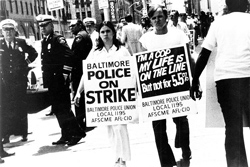 Seventy three were fired. I was one of them. But the department received the benefits and salary increases we demanded before we went on strike. Seventy three were fired. I was one of them. But the department received the benefits and salary increases we demanded before we went on strike.
Do I regret being fired? Yes! I liked being a cop and by all accounts, I was a very good one and seemed to be on a fast track toward advance promotions. Do I regret what we accomplished by going on strike? No! As drastic as it was, going on strike is the only reason the City of Baltimore and BPD brought our pay and benefits on par with other big city police departments. I'm sure it also helped in recruitment and retention.
I found that being a police officer gets in your blood. Although it has been almost 40 years since I was a sworn officer, I have worked in the field for that entire time. In 1980, I was hired by the Baltimore City State's Attorney's Office as an investigator for the newly formed Sex Offense Task Force. I was told that it was a one year job. I stayed there for 20 years and began teaching police after about 5 years.
I am presently the lead investigator for the Civilian Review Board in Baltimore City and charged with investigating cases involving Baltimore City police, Baltimore City Sheriffs and Baltimore City School police.
DID YOU SERVE IN THE MILITARY PRIOR? AND IF SO, IN WHAT BRANCH OF SERVICE? IN WHAT WAYS HAS MILITARY SERVICE INFLUENCED YOUR CAREER IN LAW ENFORCEMENT?
I volunteered for and served in the United States Air Force from Nov 1965 to Feb 1969.
While at Lackland AFB, Texas going through Boot Camp there was a test given to volunteers to see if they had an aptitude to learn a language. I took the test and apparently  did pretty good on it. I was then told I would be attending a language school upon completion of basic training. did pretty good on it. I was then told I would be attending a language school upon completion of basic training.
There were a lot of us waiting for orders after completing boot. We were then told that the group would be split into two groups, Air Police and Radio Interceptors. No mention of language school, however. They split the computer cards and I found myself going to Biloxi, Mississippi to attend Radio Interceptor school. From there it was off to Italy in the 6917th Security Group at San Vito to monitor and interceptor radio transmissions coming and going to the Soviet Union. I was there from 66-68 with some time spent in Germany, Israel and occupied Jordon. And from there it was back to the States to Fort George G. Meade, Md. where I was assigned to work at the NSA (National Security Agency.) In was this last assignment where I picked up my 4th stripe in three years before getting a nine-month early out.
The Air Force instilled in me a self-discipline that allowed me to approach tasks and situations with greater confidence. I also learned how my individual skills worked much better when I was contributing to a project as a team member and not just an individual. I also believe by being forced to work within a chain of command were specific duties and responsibilities are clearly defined, helped me get through the police academy. The Air Force also instilled in me honor, service, integrity and loyalty--all of which are needed in Law Enforcement.
WHICH, OF THE AGENCIES OR DEPARTMENTS YOU WERE ASSIGNED TO, DO YOU HAVE THE FONDEST MEMORIES OF AND WHY?
During my five years on the force, I was primarily in two units: Tactical Division (TAC) and Criminal Investigation Division (CID). Both of these divisions had multiple responsibilities, meaning I got to do a host of different jobs. Among those many jobs were riot control, homicide, burglary, sexual 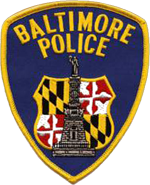 assault, vice and auto theft. Sometimes I wore civilian clothes as a detective and at other times, my uniform. But of all the jobs I had, I think being a detective in CID working auto theft with my partner Ken Patrick gives me the fondest memories. assault, vice and auto theft. Sometimes I wore civilian clothes as a detective and at other times, my uniform. But of all the jobs I had, I think being a detective in CID working auto theft with my partner Ken Patrick gives me the fondest memories.
Ken and I made a good team. We were both fully dedicated to stopping the record car thefts in the Northwest District. We worked long hours on surveillance, chasing down tips, developing reliable CIs (confidential informants) and made a great good-cop-bad-cop team in the interrogation room. All this things combined is why we were able to cut in half the auto thefts in our area of operation. We were also fair nor did we give any suspects a hassle.
On the street my nickname was Mr. Six (my detective badge number) and my reputations was that I didn't lock anyone up on a hunch. I had to have evidence that the person I was going to arrest was in all probability guilty of the crime he or she was accused of committing. I didn't like "dirty cops" and I never wanted to have the appearance of being one.
While CID was my best memories, TAC is a close second because of all the varied experiences I had while assigned to it and the lessons I learned from the "old timers" in the squad.
FROM YOUR ENTIRE LAW ENFORCEMENT CAREER WHAT PARTICULAR INCIDENT HAD THE BIGGEST IMPACT ON YOU AND WHY?
Obviously it was being fired from the Baltimore Police Department because I helped organize the 1974 police strike. At the time I was due to be promoted to Sergeant in December 1974 but I was also the vice president of the Police Union and there were major inequities 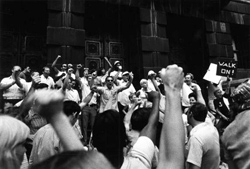 in pay and benefits in the department. After all, we were in the top 20 police departments nationwide in effectiveness and results but our pay was so low, it couldn't be found on a national pay scale. in pay and benefits in the department. After all, we were in the top 20 police departments nationwide in effectiveness and results but our pay was so low, it couldn't be found on a national pay scale.
We had tried for years to get the City of Baltimore and the police leadership to raise our salaries and other benefits but it always fell on deaf ears. That's when we decided we needed to go on strike, which hadn't been done since the Boston PD was forced to go on strike in 1924. One might argue we could have had a 2nd job but the only secondary employment allowed was driving a taxi and the police comish told us where we could drive it and of course we were mandated to be armed 24/7. So after trying to negotiate with the brass, we went on strike along with the jail guards, teachers and sanitary crews.
Out of all of the striking persons, only some of the police were fired, including me. So instead of being promoted to Sergeant in December, I was terminated in October for my alleged union affiliations.
The strike worked, however. We got everything we bargained for.
OF THE MEDALS, AWARDS OR BADGES YOU RECEIVED, WHAT IS THE MOST MEANINGFUL TO YOU AND WHY?
This is a sore subject for those of us in the BPD back in the 60s and 70s.
In those days if we did something outstanding we felt deserved some recognition we had to write it up the award or medal ourselves and submit it to our immediate supervisor for consideration. This is absolutely in violation of any award system I have encountered. Imagine a warrior in combat deciding what level of heroics he had accomplished and them putting himself in for the appropriate medal.
Such a practice in any uniformed service does little to honor the award or medal. Instead it weakens its value and significance. That's I did not feel this was the right way to go and never wrote myself up for any commendations.
WHICH INDIVIDUAL PERSON FROM YOUR CAREER MADE THE MOST POSITIVE INFLUENCE ON YOU AND WHY?
Without a doubt, Sgt. Robert Kues. When I went back into uniform in 1970 he was my Sergeant and he let me know immediately that I was not going to double shuffle him in any way. After several months he appointed me to OIC (officer-in-charge) for when he was off. "Why me? You have guys with 14 years experience in the squad." He told me that it wasn't because I was such 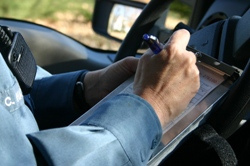 a hot shot, but because I could write a good report and that when he wasn't around the squad could take care of itself, he just wanted me to be sure all the reports were done right. So on one hand he praised me but brought me back down to earth real quick. a hot shot, but because I could write a good report and that when he wasn't around the squad could take care of itself, he just wanted me to be sure all the reports were done right. So on one hand he praised me but brought me back down to earth real quick.
He was also my mentor. For the three years I was his OIC, Sgt. Kue would send me to Homicide, Burglary, Vice or wherever there was a request for additional bodies. He told me he wanted me to learn as much as I could as quick as I could so that I could get promoted, adding, "Boy you keep your mouth shut and when you make major you can get me as your driver." But he was already the most influential person in my time with the department. Even after I transferred from his command, he kept after me to take the sergeants' exam; I did and I passed.
The squad was very loyal to Bob Kues who went on to become a Lieutenant in the Bomb Squad.
CAN YOU RECOUNT A PARTICULAR INCIDENT FROM YOUR CAREER THAT WAS FUNNY AT THE TIME AND STILL MAKES YOU LAUGH?
There was one incident of good cop-bad cop that still makes me laugh.
My partner, Ken Patrick, was playing the good cop as he was interviewing/interrogating a suspect for auto theft who absolutely refused to confess to anything. The plan was for me to enter the room with a briefcase 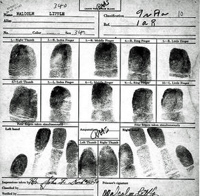 full of documents from a court case I had been on earlier that morning. In addition to the real documents from that case, I had put in a fingerprint card with the suspect's information on it. The thing is, it wasn't his finger prints but mine that I had rolled just before going into the room. full of documents from a court case I had been on earlier that morning. In addition to the real documents from that case, I had put in a fingerprint card with the suspect's information on it. The thing is, it wasn't his finger prints but mine that I had rolled just before going into the room.
When I walked into the interrogation room, I yelled, "Let's stop playing social worker here. I don't want a confession. I already have his prints on over 50 stolen cars. No way is he going to get a deal on these charges." I looked him square in the eyes and told him he'd be in prison so long he'd likely be buried under the jail. I then threw down the case file from my earlier court session onto the table in such way that allowed its contents to spill out, including the fake fingerprint card.
The suspect picked up the card with his name on it and looked at Ken and me. Ken moved in and told him that he had better tell him about the cars because I was ready to get him 3 years on each stolen car. He quickly confessed to stealing dozens of cars, giving, dates, times and make/model of the cars. He then asked me how did I get his prints from all those cars when he was wearing gloves and had never been arrested before?
Ken and I laughed about it when we thinks that here was a dumb criminal (which many are) who still do today!
WHAT DO YOU CONSIDER THE MOST IMPORTANT LESSON YOU HAVE LEARNED AS A LAW ENFORCEMENT OFFICER?
Never judge a book by its cover. Some of my most respectful-looking suspects turned out to be the biggest, baddest crooks while other obviously guilt-looking suspects were not guilt (at least not for that particular crime). That's why Ken and I were careful in getting our facts straight before accusing anyone of a crime.
I also try to give those who have committed misdemeanors some slack after carefully looking at the suspect and the situations. I figured if a person, especially a juvenile,  is not an habitual criminal but someone who made a mistake I felt it was better to impress on him or her what they did was wrong and how it could ruin the rest of their lives and instead of arresting them, I'd cut them loose. On the other hand, if you have a suspect that is clearly guilty, do whatever it takes to get them into custody. is not an habitual criminal but someone who made a mistake I felt it was better to impress on him or her what they did was wrong and how it could ruin the rest of their lives and instead of arresting them, I'd cut them loose. On the other hand, if you have a suspect that is clearly guilty, do whatever it takes to get them into custody.
Just because you are working in a crime ridden neighborhood, not all of the people there are criminals. You must judge each person separately and not go by what they wear or the color of their skin. Look at each person separately and if you are certain the crime is a smile misdemeanors, as I said before, cut them loose. Then you have someone out there who may come to your assistance in the future and you may have just turned a young person from a life of crime by giving them a second chance. Do not lump all people together.
WHAT LAW ENFORCEMENT ASSOCIATIONS ARE YOU A MEMBER OF, IF ANY? WHAT SPECIFIC BENEFITS DO YOU DERIVE FROM YOUR MEMBERSHIP(S)?
I am no longer a member of any organized police associations. I was vice president of Baltimore Police Department Local 1195 of the American Federation of State, County and Municipal Employees AFL-CIO, but after the strike of l974 the union was dissolved by the "comish" (Police Commissioner).
TogetherWeServed.com is the only "association I am with now. I try to keep in touch with the guys I served with in the department, but unfortunately we are at an age where the ranks are thinning as they pass on.
HOW HAS SERVING AS A LAW ENFORCEMENT OFFICER INFLUENCED THE WAY YOU CONDUCT YOUR PERSONAL LIFE AND YOUR RELATIONSHIPS WITH OTHERS OUTSIDE OF THE DEPARTMENT?
Being a Law Enforcement Officer (LEO) was a carryover from a strong moral foundation from my Catholic upbringing and from my years in the military. Both operate on loyalty, integrity and truth. It also provides me with a clear sense of right and wrong as well as a process for evaluating a situation rather than rush to judgment. I try to look at people as friends until they give me reason to think otherwise.
Though I have not been a sworn officer for almost 40 years, I have been able to stay in the business as a civilian and have been told that I still walk, talk and act like a cop. I like to believe that means I am someone who knows what he is doing and does so with certainty and purpose. But that's not too surprising since I like results and what I learned in the military and the police force gave me the tools I need to achieve the desired outcome.
WHAT ADVICE WOULD YOU HAVE FOR A ROOKIE WHO HAS JUST PUT ON THE BADGE?
Don't let that badge and gun weigh you down! Find an experienced officer on your shift or in your squad willing to act as your mentor. He or she will have been though all the pitfalls and would have made the rookie mistakes that could have been avoided.  Learn from their mistakes and experiences. They are the best teachers you will find anywhere. Learn from their mistakes and experiences. They are the best teachers you will find anywhere.
Also keep in mind that the foundation of the information you learn in the academy is the BEGINNING and the real learning is done on the job. Do not fall into the "them and us" mentality. Treat people with respect and more than not, you will receive it in return. Don't be a jerk or manhandle a suspect as it sets you up for criminal charges and it tarnishes the badge and the department. Never falsify an affidavit for an authorization from a judge for a search and seizure. You may think that you have to put in what you need to get the paper, but it will come back to bite you.
There were problems with drugs and guns before you raised your hand and when you retire or leave the force, there will still be problems with drugs and guns. Do not sell your integrity or honor for one arrest. If you lose your reputation for honesty you can no longer function as a LEO. And if you make a mistake, don't lie about it. Man up and get on with your life. The minor mistake is no big thing, but trying to lie about it increases its importance and doing so takes away your integrity and credibility.
IN WHAT WAYS DO YOU FEEL THIS WEBSITE CAN BENEFIT THE LAW ENFORCEMENT COMMUNITY?
TogetherWeServed.com's Law Enforcement Officer site is a wonderful place for police officers from all over the United States to come together. This is the perfect place to "speak in the language cops understand." There is absolutely no other place for LEOs from different law enforcement agencies to 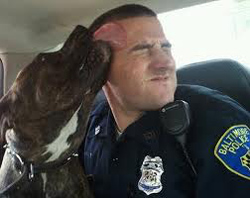 share their experiences and to exchange information on their careers. But I feel it is under used by most members at this time. share their experiences and to exchange information on their careers. But I feel it is under used by most members at this time.
I hope LEO members will become active on this site by interacting more with other members and by completing their Reflections so their stories and advice can be read by others who can learn from them, especially the young police officers. You young officers can learn from old cops like me who have been there, done it, learned from it and now want to assist the rookie with becoming a good LEOs in making the right choices during their time on the force. And hopefully some of the old timers will get off their duffs and start connecting more through this site as well
Thank you TWS for giving us this place to connect, reconnect and to share with our brother and sisters LEOs.
|
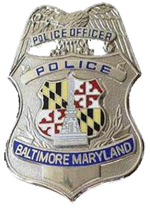
DET Ryan's Police
Badge Display Courtesy of

|
|
Share this Voices on:


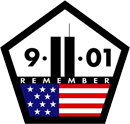

|
|
TWS VOICES
TWS Voices are the personal stories of men and women who currently serve, or who previously served as a US Police or Federal Officer, and conveys how serving their Country and Community has made a positive impact on their lives. If you would like your story to be featured in a future edition of Voices, or know someone else who may be interested, please contact TWS Voices HERE.
This edition of Police Voices was supported by:
Police.Togetherweserved.com
For all current serving and veteran Police Officers, Together We Served is a secure, feature rich website enabling Officers to reconnect with lost Brothers and Sisters, share in the camaraderie of other Officers, network for professional purposes and to honor the service of all.
To join Police.Togetherweserved.com, please click HERE.
| |